This is the MIG deal
by Ranil Wijayapala
The purchase of the MiG-27 fighter jets to the Sri Lanka Air Force to
effectively face the challenges of the LTTE in the North and East has
once again become a controversial topic among the public.

With some elements trying to explain the deal as one of the most
corrupt deal running into millions of dollars, the Sri Lanka Air Force
and the Ministry of Defence squarely rejected the allegations saying
that there was no room for anyone to make a profit out of the deal.
Some politicians had taken the issue for their own political
advantage highlighting the purchase as one of the most corrupt deals
undertaken by the Government and even went to the extent of taking it
before the Commission to investigate Bribery or Corruption, to place the
Government responsible for the alleged charges.
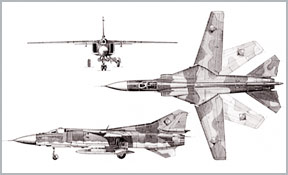
But anyone who had closely monitored the process adopted by the Sri
Lanka Air Force to purchase the four MiG-27 would have understood that
there was no possibility at all for any individual to interfere in the
purchasing process of the MiG -27.
Requirement
The requirement to purchase MiG-27 came from the Sri Lanka Air Force
with the on-going intensive operations to crush terror activities of the
LTTE in the North and East. The requirement came as the SLAF had only
few attack aircraft in 2006 for all the operations that had to be
carried out in the North and East.
Though the SLAF's requirement was for two full squadrons of twenty
four (24) fighter jets but were left with only four MiGs which had
completed their lifespan and another nine Kfir fighter jets to carry out
its operations.
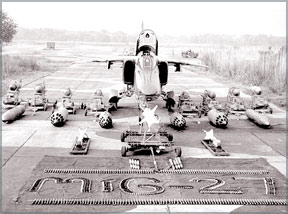
Fifty per cent of fleet are serviceable but only half of them could
be used for operations duty on a daily basis. That means, there was 50
per cent short fall in jets to carry out its operations effectively.
It was under these circumstances, three out of the seven MiG 27
available with the SLAF were put out of service, one in July 01, 2000,
another on December 27, 2001, and the third one in June 9, 2004. The
balance four MiG 27 fighters have been grounded due to completion of
lifespan and were in dire need of urgent overhaul.
The first option
With SLAF pointing out this requirement, the government first sought
the assistance of the Indian Government as it was known that nearly 200
MiGs were available in the Indian Air Force.
The request was forwarded to the Indian Government when President
Mahinda Rajapaksa visited India. But India rejected the request on the
basis that Indian Air Force cannot spare the available MiGs to another
Air Force.
Then, the SLAF had to turn to Ukraine, from whom the Government of
Sri Lanka had purchased MiG 27s earlier in the year 2000.

Since the manufacture of MiG 27 had ceased by 1991, the Government
had to choosen the best out of the available lot from Ukraine.
The SLAF then called for quotations from the Ukrinmash Company in
Ukraine, which was the sole manufacturer for MiGs, for four MiG 27M
aircraft and also to overhaul another three MiG 27 and one MiG 23 UB.
Under these circumstances the Ministry of Defence gave clearance to the
SLAF to go ahead with the purchase.
***
THE PROCESS: Appointment of TEC
On February 16, 2006, the Ministry of Defence requested the National
Procurement Agency to appoint a Technical Evaluation Committee (TEC) to
evaluate the proposal and also nominate the members to the Committee.
Accordingly, the NPC appointed a six-member Committee, which
comprised Air Vice Marshal W. D. R. M. J. Goonetilleke (Chairman), Air
Commodore E. G. J. P. De Silva, Director, Aeronautical Engineer, H. D.
Weerasiri, Accountant, Ministry of Defence, Dr.D. P. T. Nanayakkara,
Senior Lecturer, University of Moratuwa, J. V. Premaratna, Deputy
Director (Airworthiness) Civil Aviation Authority, Mrs. K. D. R. Olga,
Accountant, Department of Budget.
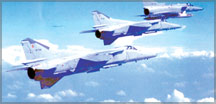
After detailed evaluation of the proposal submitted by the Ukrainian
company purchase of four MiG 27 M aircraft from Ukrinmash was
recommended.
The committee also evaluated other proposals submitted by the DS
Alliance in Sri Lanka, HAL Company in India, Hazel Company in UK, to
overhaul the other four aircraft.With the approval given by the TEC, a
Cabinet-appointed procurement Committee was appointed to approve
procurement. The Committee decided to appoint a negotiation committee
consisting of civil officers from the public service.
Following members Premathilake, Director General/ State Accounts, H.
M. T. D. Herath, Senior Assistant Secretary, Presidential Secretariat,
N. J. P. Gunasekera, Accountant Ministry of Defence and Air Vice Marshal
A. M. M. Goonatilleke and Air Commodore Silva were appointed to
negotiate the price with Ukrinmash.
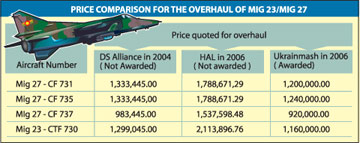
However, the Ukrinmash stated that the price quoted was the best
bargain as the deal was done on a G to G basis. With this, the Cabinet
Appointed Procurement Committee approved the purchase.
Then a six-member committee including Director Aeronautical
Engineering, a MiG pilot, an interpreter and a civilian member of the
TEC visited Ukraine to conduct a thorough check on the aircraft engines
and on the three overhaul facilities in Ukraine.
Then the Ministry prepared the Cabinet Memorandum to purchase the
four MiG 27 and to overhaul the other four aircraft. With the Cabinet
giving the nod for the deal, on July 6, 2006 two teams from the Sri
Lanka Air Force visited Ukraine to observe the overhaul process spending
16 weeks there.
Air Force Commander Air Vice Marshal Roshan Goonetilleke formally
accepted the aircraft from the Ukrinmash company at the end of last
year, after a factory inspection.
Why SLAF selected MiG- 27
The major reason for the SLAF to decide on the purchase was due to
its capability with its capacity to transport maximum pay load, 3,000
Kgs at one time. In other words it could fly with 6 to 8 bombs weighing
500 Kgs, at one time.
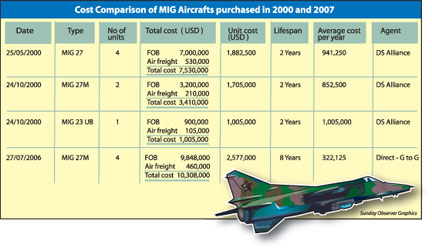
If the SLAF selected a brand new ground attack craft other than the
MiG -27 it had to go for pilot conversions because they already had
trained pilots to handle Mig 27s. If they go for a new aircraft the SLAF
will have to train their pilots for that particular aircraft which will
definitely be an added burden for the SLAF.
Apart from this the SLAF has to train the maintenance crew if they go
for a new aircraft at this point, with an additional burden on the
economy and the SLAF.
The SLAF did not go for a MiG 29 at that time since there was no
necessity for them to have an aircraft which can play the role of an
interceptor as it was the time prior to the LTTE coming out with air
capabilities.
If they had to go for brand new aircraft they had to either select
MiG 30 which is too sophisticated for the SLAF. This will be an
additional burden on the economy as it will increase the expenditure by
five to six fold, another additional burden on the economy. Difference
between earlier and latest purchases
The difference between the purchase of MiG 27 in 2000 and the latest
procurement was based on the lifespan of the aircraft. In comparison of
the life time of the aircraft purchased in the year 2000 with 2006, it
has been revealed that there was a cost advantage of US dollar 530,375
per aircraft per year for the Sri Lankan Government on the purchase of
MiG 27 M in 2006.In 2006 Sri Lanka's purchase of four MiG 27s with eight
years lifespan compared to the two years lifespan of the aircraft
purchased in the year 2000.
With the purchase of MiG 27 in 2000 Government had to pay extra to
extend the lifespan. Apart from the purchase of four aircraft the
Ukrinmash also agreed to fully overhaul the four remaining MiGs lying
idle with the SLAF. Earlier cheaper prices were offered for these
aircraft to purchase them without any overhaul of the aircraft. This
time, prices have been offered for the purchase of aircraft with a eight
years lifespan.
Negotiations with Ukraine
Since the deal has been classified as a Govt. to Govt. basis, the
mode of payment was done according to the agreement which was reached
with Ukrinmash, a fully Government Company.
The Ukrinmash had nominated Bellimissa Holdings Ltd., to receive the
payments from the Government of Sri Lanka on behalf of the Ukrinmash as
it was the financier of the deal. According to the Government, on many
occasions the Government had made payments to companies nominated by the
respective Governments though negotiations were done on the G to G
basis.
Air Vice Marshal Roshan Goonetilleke, Commander of SLAF:
"I cannot understand as to why some people continue to make
allegations on the MiG 27 deal. I had clarified this matter. They make
allegations that these are obsolete aircraft and old aircraft, and also
say that lives of pilots are in danger.
"Then they say we are buying the same aircraft which we bought in
2000, now at a higher price. Then they also say that what we had
rejected then in 2000, we are purchasing now. These allegations do not
present the correct picture.
"Because in 2000, we purchased so many aircraft. So that does not
mean that the aircraft we did not purchase then were not suitable. They
were suitable alright but we went for the most suitable at that time.
But we have to go to the same place again and buy. So that's what
happened in 2006. We selected four more aircraft out of them and no one
can say we rejected them in 2000.
"But we buy what we think is suitable for us and not the
commentators. But this is not unsuitable. Some people say that there
should have been competent evaluation team to see whether the SLAF needs
MiG 27. But the thing that they always forget is the fact that we
already have MiG 27.So somebody thinks that MiGs are good in 2000 we are
only adding to the fleet. So that point is disproved there.
"Then what we bought in 2000 and 2006, there is one basic difference.
In 2000 we got it without an overhaul. In 2006 we did an overhaul before
buying it. Obviously when you do an overhaul you have to add the
overhaul cost to the price. Overhaul costs money.
You have to remove the entire engine, and do all the tests. Check
from A to Z everything. When you add all these aspects, actually what we
had bought this time was a good bargain.
"Our pilots are very pleased about the aircraft. It is absolutely
untrue to say that our pilots do not like this aircraft. And they have
affirmed that this is good aircraft to fly especially with lots of
power. We are on several offensive operations against the LTTE.
In my opinion and the opinion of all pilots this MiG 27 is good for
our scenario. But this an old aircraft. But younger than the Kfirs. May
be some people write these things with some ulterior motives. May be we
can give them a better picture if they contact us.
"The CO of the MiG also confirms the fact that MiG 27 is a reliable
machine and a very effective machine to fly. They are confident to fly"
MiG 27s. He says the SLAF used the MiG 27 extensively and effectively
for their operations in the North and East".
****
What is MiG 27?
MiG 27 is an attack aircraft capable of carrying a wide range of
ammunition. Effectively used ground attacks aircraft and is capable of
delivering munitions accurately on enemy position. The aircraft was
first introduced to SLAF in 2000.
Presidential directive
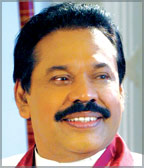
President Mahinda Rajapaksa has requested the BriberyCommission to
commence an immediate probe into the recent MIG 27 deal. Secretary to
the President, Lalith Weeratunga said President Rajapaksa has asked the
Bribery Commissioner to make an independent investigation.
Air Force's Serviceability
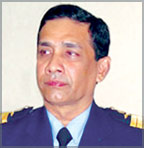 Prior
to the purchase of four MIG 27s, the SLAF only had an air serviceability
of 50%. Prior
to the purchase of four MIG 27s, the SLAF only had an air serviceability
of 50%.
The used MIG 27 brought from 2000 to 2005 were grounded after ending
their certified number of 100 flying hours. But with the introduction of
four MIG 27 after overhauling by Ukraine Marsh, the serviceability of
SLAF has been increased to 75%. |
